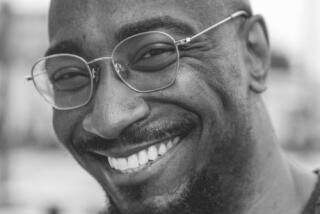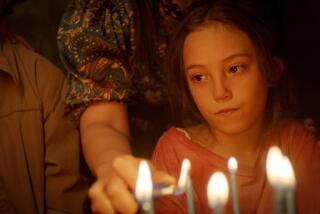Richard Lange’s ‘Angel Baby’: a thriller that makes its own terms
About a third of the way through his new novel, “Angel Baby,” Richard Lange elevates the stakes. This is no Act 1 climax I’m talking about, no predictable plot point, but rather something far more unexpected, a situation that upends our sympathies.
Until then, we’ve been following Luz, the wife of a Mexican drug cartel leader, as she escapes from his armed compound in the hills above Tijuana, shooting a maid and a bodyguard, stealing a backpack full of cash. Luz wants to go to Los Angeles, where she left her young daughter Isabel with an aunt three years earlier. But first, she needs to cross the border before her husband, a brute known as El Principe, discovers she’s gone.
“[I]f only it were possible,” she thinks, “to set fire to the past and everyone in it.” Little does she know how prophetic such a sentiment will become by the end of this strong and relentless book.
El Principe figures out what’s happening pretty quickly, and to get his wife back, he brings in a reluctant enforcer named Jerónimo, who wants nothing more than to get out of the life. “It’s the last thing I’ll ever ask you to do for me,” the drug lord tells him. “How does that sound?”
Jerónimo knows he has no options, but just what this means becomes clear only when he is confronted with a sinister surprise. I’m being purposely vague so as not to spoil the moment, but suffice it to say that here we have the hinge of the entire novel, a shift that alters everything we thought we understood.
I’ve never seen a thriller quite do this, but then “Angel Baby” is a thriller that makes its own terms. Beautifully paced, deftly written, it is a book about moral compromise, in which we have empathy for everyone (or almost everyone) and no one at once.
Lange, who lives in Los Angeles, knows his way around the border, not to mention the fringes of Southern California, where his two previous books, the 2007 collection “Dead Boys” and the 2009 novel “This Wicked World,” were set. But he also recognizes something essential about character, which is that it is resilient only to a point.
This is true not only of Luz and Jerónimo, both of whom are at the edges of their perseverance, but also of Malone, a San Diego County burnout who makes his money ferrying people across the border, and Thacker, a corrupt border patrol officer looking for a way out of the chaos he has made of his life. In slipping back and forth among this quartet, the novel consistently subverts our sense of right and wrong in favor of something like raw need.
“[T]he job he once enjoyed,” Lange writes of Thacker, “has become just another block of hours to be endured, another load that he used to bear effortlessly but that now threatens to bring him to his knees.” That’s nothing compared to Malone, who seeks not relief but dissolution: “He’s done with the world, has been for years.”
What, “Angel Baby” wants us to imagine, happens when we cross the line separating desperation from desolation? What happens when we give up the ghost?
And yet, if Malone and Thacker are victims of their own weaknesses, Luz and Jerónimo face a far more treacherous conundrum; they are complicit in their fates. This makes them more tragic but also more moving — we root for both of them, even though they operate at cross-purposes for much of the book. There we have the moral compromise, the moral complexity, made more powerful because in caring for them, we are implicated as well.
One standard template of the thriller is that it asks us to take sides: There is a protagonist and an antagonist, and the plot unfolds like a chess match until the former finally prevails. Lange, however, turns that on its head, offering two characters who chase one after the other in a game neither can win.
In such a book, whom do we align with? As with life, “Angel Baby” offers a story in which motivations are murky and every act is weighted, and the best we can hope for is that the means will be justified by the results.
In the end, Lange can’t completely sustain it; the closing chapters zero in on a resolution they don’t fully earn. But this is a minor criticism, really, for a book that does so much so well. “Angel Baby” is taut and vicious, unfurling like a rumba of rattlesnakes.
“A powerful man has enemies, a successful man breaks hearts,” Lange writes, “and the losers will always try to destroy the winners and drag them back down into the mud.”
Angel Baby
A Novel
Richard Lange
Mulholland Books: 288 pp., $26
More to Read
Sign up for our Book Club newsletter
Get the latest news, events and more from the Los Angeles Times Book Club, and help us get L.A. reading and talking.
You may occasionally receive promotional content from the Los Angeles Times.







